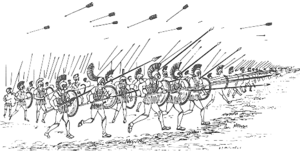Corinthian War
| Corinthian War | |||||||||
|---|---|---|---|---|---|---|---|---|---|
| Part of the Spartan hegemony | |||||||||
 Hoplites in combat |
|||||||||
|
|||||||||
| Belligerents | |||||||||
|
Sparta Peloponnesian League |
Athens Argos Corinth Thebes Persian Empire Other allies |
||||||||
| Commanders and leaders | |||||||||
| Agesilaus and others | Numerous | ||||||||
The Corinthian War was an ancient Greek conflict lasting from 395 BC until 387 BC, pitting Sparta against a coalition of four allied states, Thebes, Athens, Corinth, and Argos, who were initially backed by Persia. The immediate cause of the war was a local conflict in northwest Greece in which both Thebes and Sparta intervened. The deeper cause was hostility towards Sparta provoked by that city's "expansionism in Asia Minor, central and northern Greece and even the west".
The war was fought on two fronts, on land near Corinth (hence the name) and Thebes and at sea in the Aegean. On land, the Spartans achieved several early successes in major battles, but were unable to capitalize on their advantage, and the fighting soon became stalemated. At sea, the Spartan fleet was decisively defeated by a Persian fleet early in the war, an event that effectively ended Sparta's attempts to become a naval power. Taking advantage of this fact, Athens launched several naval campaigns in the later years of the war, recapturing a number of islands that had been part of the original Athenian Empire during the 5th century BC.
Alarmed by these Athenian successes, the Persians stopped backing the allies and began supporting Sparta. This defection forced the allies to seek peace. The Peace of Antalcidas, commonly known as the King's Peace, was signed in 387 BC, ending the war. This treaty declared that Persia would control all of Ionia, and that all other Greek cities would be independent. Sparta was to be the guardian of the peace, with the power to enforce its clauses. The effects of the war, therefore, were to establish Persia's ability to interfere successfully in Greek politics and to affirm Sparta's hegemonic position in the Greek political system.
In the Peloponnesian War, which had ended in 404 BC, Sparta had enjoyed the support of nearly every mainland Greek state and the Persian Empire, and in the months and years following that war, a number of the island states of the Aegean had come under its control. This solid base of support, however, was fragmented in the years following the war. Despite the collaborative nature of the victory, Sparta alone received the plunder taken from the defeated states and the tribute payments from the former Athenian Empire. Sparta's allies were further alienated when, in 402 BC, Sparta attacked and subdued Elis, a member of the Peloponnesian League that had angered the Spartans during the course of the Peloponnesian War. Corinth and Thebes refused to send troops to assist Sparta in its campaign against Elis.
...
Wikipedia
